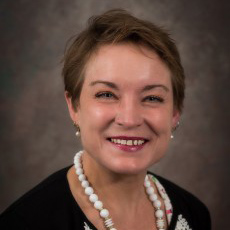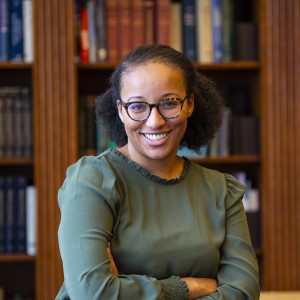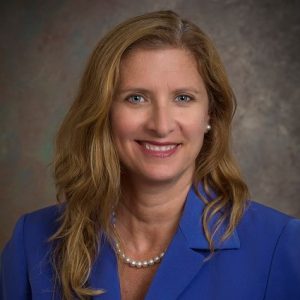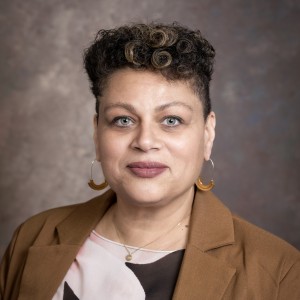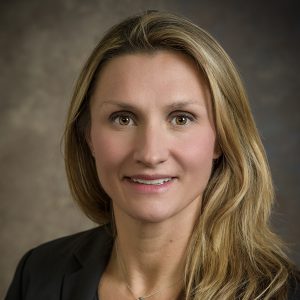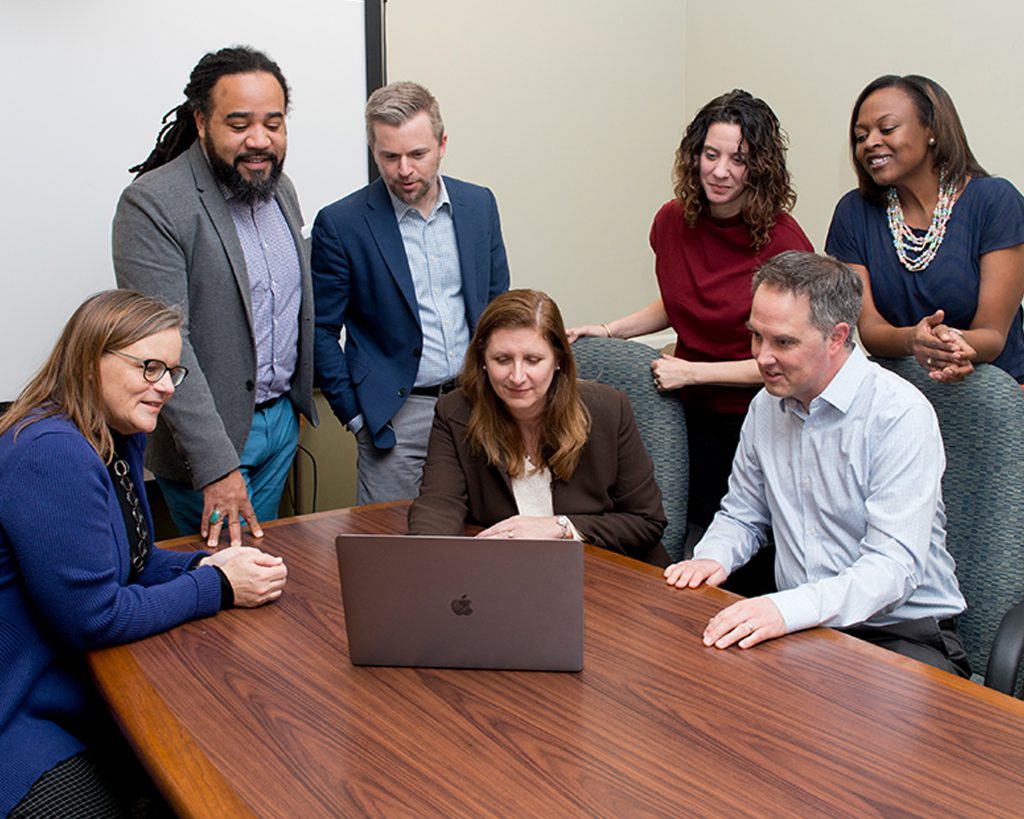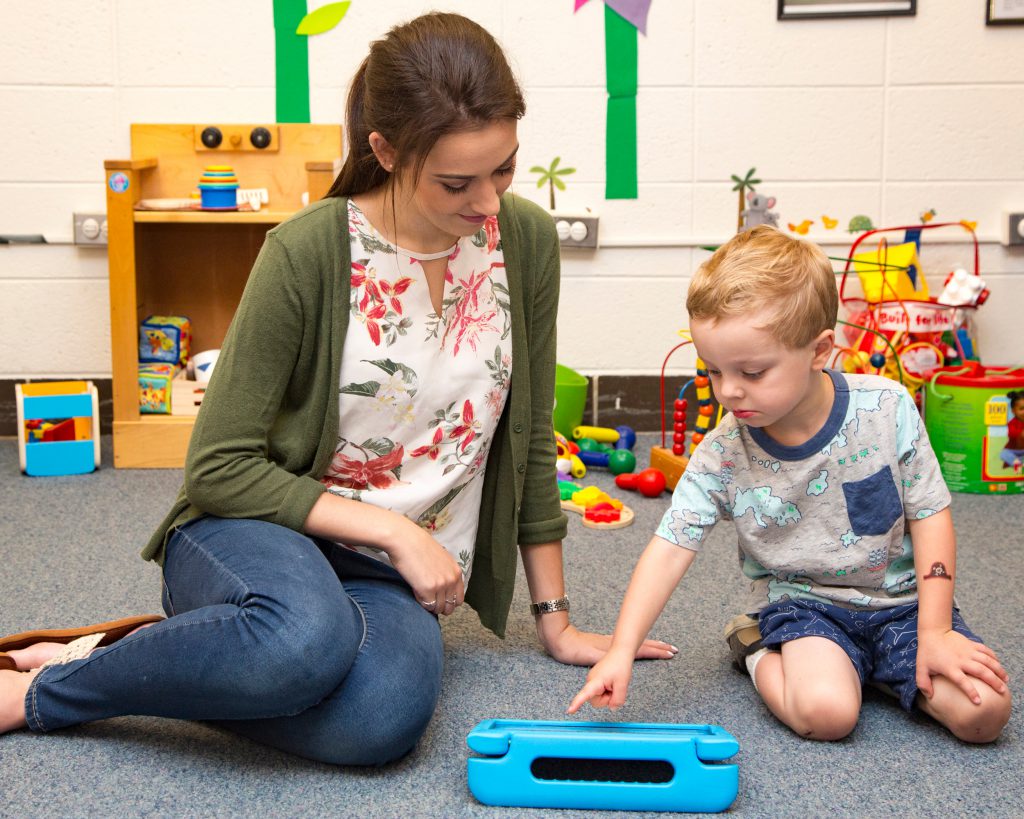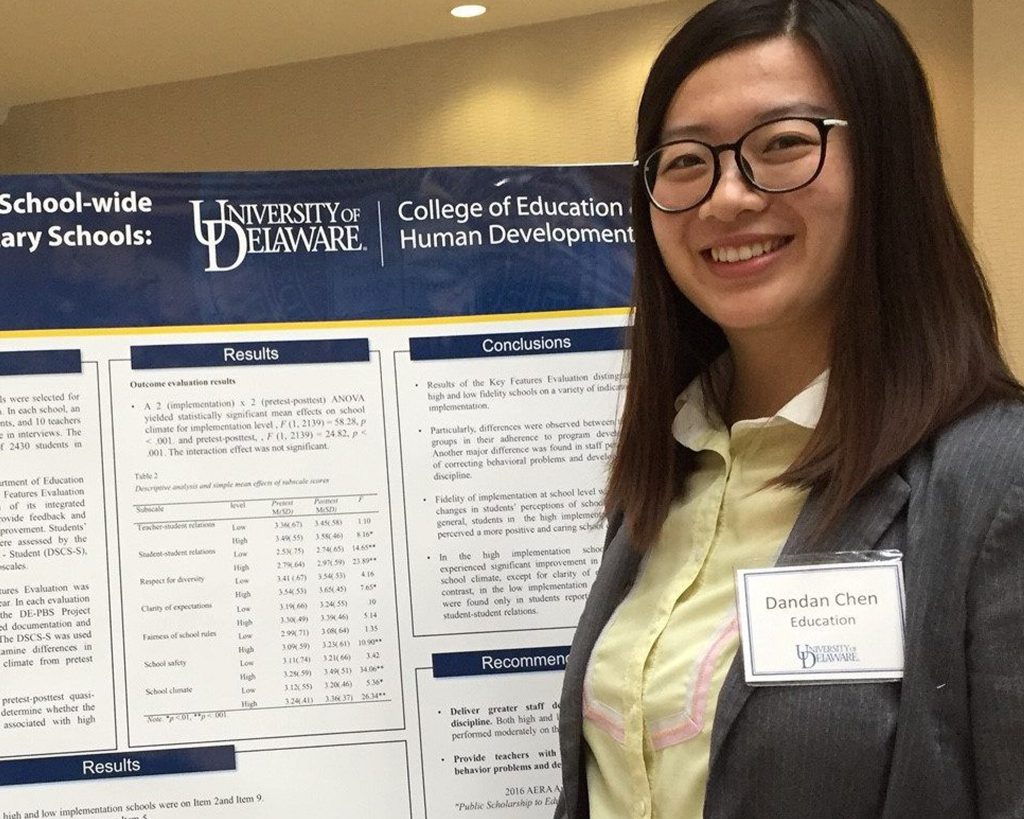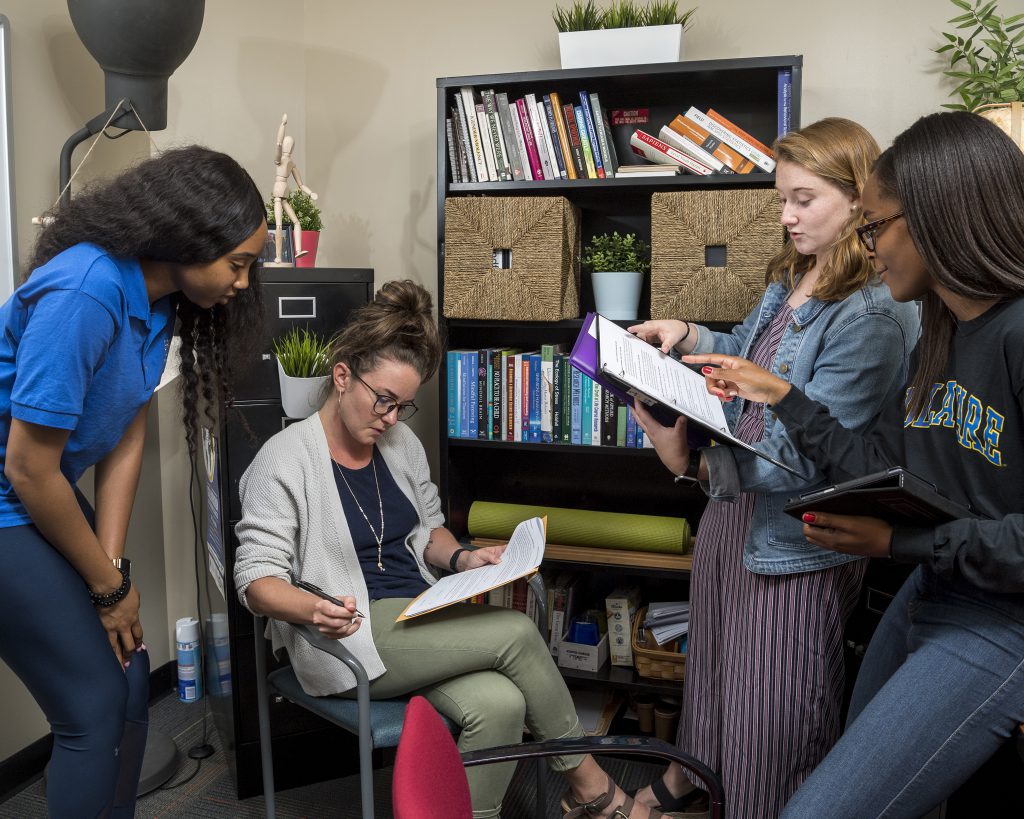Research
Education & Social Policy
Education is not only influenced by social policy, education is social policy. How communities decide to operate and fund their schools, colleges and early learning centers is just as likely to affect academic outcomes as any number of additional social, economic and political conditions. Teacher training and retention plays a major role in student learning, but so too does a community’s welfare and housing policy, access to healthcare, and systemic racism.
At the University of Delaware’s College of Education and Human Development, our faculty collaborate with state and local educators and policy makers to pursue research that will have a real world impact on the educational experiences of students and their families. A recent study of two school turnaround initiatives in Tennessee has demonstrated that successful reform in low-performing schools must reduce teacher turnover while implementing strategies for hiring and retaining effective principals and teachers. And as more parents are staying home with their children due to the COVID-19 pandemic, our faculty are engaged in numerous research projects examining the ways that state and local governments can better support virtual education, at-home learning and family child care.
Researchers by Topic
Nationally, studies have demonstrated that disciplinary approaches, such as suspension and expulsion, are overly applied to boys, children of color, and children with disabilities with devastating consequences. How can we prevent early childhood programs from using these approaches for children from birth to age 5? Martha Buell’s research in education and social policy centers on the quality of early care and education for infants and toddlers. Her most recent project, funded by the US Department of Health and Human Services, analyzes the alignment and cohesion between the federal Child Care and Development Fund policy guidance in relation to disciplinary approaches and state-level policy actors.
How can state and local governments better support family child care environments? Rena Hallam has served as lead investigator across multiple federally funded research projects examining early childhood transition, child assessment, and the intersection of child care quality and subsidized child care. Currently, she is Principal Investigator on a federally funded study of professional development approaches to support and enhance the quality of care in family child care settings, and is Co-Principal Investigator of the Starting At Home Project, which designed to study the impact of a parent-child intervention implemented by Early Head Start home visitors.
Infants and toddlers who are exposed to chronic stress may suffer lifelong consequences that contribute to mental health disorders, learning deficiencies and emotional instability. However, Jason Hustedt has found that the opposite is also true: that nurturing relationships can reverse damage caused by chronic stress. As co-director of the Starting at Home project, which is supported by a five-year, $2 million grant from the U.S. Department of Health and Human Services, Hustedt is researching how healthy, supportive relationships may be precisely what children need to overcome stress caused by poverty, abuse and/or neglect.
In what ways does the quality of early care and education (ECE) programs promote childhood development? Anamarie Whitaker is interested in understanding how ECE policies at the local, state, and federal level influence ECE programs, classroom practices and quality, and children’s school readiness. Her recent research examines the effect of preschool curricula on teachers’ instructional practices, such as the amount, type, and quality of academic instruction provided, and children’s academic and social emotional development.
What can school districts and educational leadership do to better support teachers and help them to thrive in the classroom? According to Lauren Bailes, teacher attrition can be predicted by the initial school setting of new teachers as well as the type of certification they hold. Bailes found that traditionally licensed teachers initially placed in traditional public schools are more likely to persist when compared with other preparation types or initial placements into charter schools.
How does education policy affect and shape the access and success of minoritized students in higher education? Dominique Baker investigates student financial aid, admissions policies and policies that influence the creation of an inclusive and equitable campus climate. Current projects include research on the media’s role in constructing the public and policy actors’ understanding of race, racism and student loans (funded by the Russell Sage Foundation and the NAEd/Spencer Foundation) and test-optional admissions policies (funded by the Gates Foundation).
To what extent can teacher professional learning improve curricular-aligned instruction in districts serving primarily Black and Hispanic students? Supported by a $1.5 million Bill and Melinda Gates Foundation grant, Laura Desimone has assembled an interdisciplinary team of thought-leaders in English Language Arts and mathematics to study 12 professional learning partnerships across the country, who are trying to foster ambitious and culturally responsive instruction in districts serving mostly black or Latinx students.
Joy Esboldt’s interdisciplinary research leverages critical theories of race and learning to examine how teachers, leaders and organizations learn about race, power and equity within local and sociopolitical contexts. She is particularly interested in interactional and organizational processes of teacher learning that lead to social transformation and/or social reproduction. Esboldt employs a range of qualitative methods, predominantly grounded in partnerships with educators and educational leaders with shared commitments to cultivating more democratic and liberatory learning environments.
What steps can researchers at colleges and universities take to better support local school districts? According to Elizabeth Farley-Ripple, it begins with meaningful collaboration. Farley-Ripple is director of the University of Delaware Partnership for Public Education, a cross-campus collaboration with the broader Delaware educational community—including educators, families, and community leaders—that seeks to mobilize the university’s resources to address critical issues facing schools and improve the quality and availability of education for all students. Farley-Ripple’s recent research includes studies of administrator mobility, school and teachers’ use of data, teacher quality and effects, and equity in student outcomes.
How much does principal turnover affect student outcomes? How do the credentials and experiences of assistant principals affect their performance when they become principals? Do salary incentives affect principal performance and retention in the lowest performing schools? Gary Henry specializes in education policy, educational evaluation, educator labor markets, and quantitative research methods. Henry’s recent research showed that hiring and retaining effective and experienced teachers, as well retaining effective principals, in the low performing schools increases student achievement. Henry currently serves as Principal Investigator on an Institute of Education Sciences-funded project that investigates the implementation and impact of a school turnaround plan for low-performing schools in North Carolina. The study provides a cautionary tale for school reformers – turnaround schools reduced student achievement gains and increased teacher turnover, likely due to lack of capacity to implement the reforms as planned, limited resources, and budget cuts.
How can we understand and improve the quality of instruction in mathematics in K-12 educational settings? Erica Litke’s research focuses on understanding and improving instructional quality in mathematics across three strands: describing and analyzing instructional practices using observation instruments, connecting instructional quality to broader issues in education by understanding the policy climate in which mathematics teaching occurs, and developing teacher knowledge. In a recent study, Litke used an observation instrument she developed to examine instructional practice in algebra lessons and support professional development opportunities for teachers tied to these instructional practices.
How do teachers’ emotions and emotion-related experiences, including well-being, impact their effectiveness? Leigh McLean investigates how teachers’ emotions impact their instructional practices and the role that early-career teachers’ emotions play as they transition into the career. She is a principal investigator on two federally funded projects: one from the Institute of Education Sciences exploring how elementary teachers’ feelings and beliefs impact their effectiveness in the content areas they teach, and one from the National Science Foundation exploring how the mentored teaching experience impacts elementary mathematics teachers’ effectiveness during the early career stage.
Whitney Polk’s research investigates the educational and social inequities that influence youth development. Her research areas include the impact of school-based marginalization on adolescent academic and psychosocial adjustment, racial disparities in school discipline, school-based mental health, racial stress and trauma and racial literacy development. In collaboration with school and community partnerships, Dr. Polk also develops school-based interventions to support youth well-being and resilience.
How can policy tools remediate unequal learning outcomes for disadvantaged students? Kenneth Shores’s research centers on educational inequality and encompasses both descriptive and causal inference. His work addresses racial/ethnic and socioeconomic inequality in test scores, school disciplinary policy, classification systems, and school resources. In addition, he has examined how improvements to school finance systems can reduce educational inequality and how vulnerabilities in school finance systems can contribute to it.
How can schools, especially state-designated underperforming schools, become more resilient organizations and still make improvements? Bryan VanGronigen’s research examines a wide range of school improvement policies and efforts, from the role of school and district leadership in leading improvement efforts to educator training and professional development. Current projects include the capacity of state education agencies to improve underperforming schools, the effectiveness of external providers of school improvement services, school improvement planning, and the implementation of schoolwide leadership teams.
How does education policy affect and shape the access and success of minoritized students in higher education? Dominique Baker investigates student financial aid, admissions policies and policies that influence the creation of an inclusive and equitable campus climate. Current projects include research on the media’s role in constructing the public and policy actors’ understanding of race, racism and student loans (funded by the Russell Sage Foundation and the NAEd/Spencer Foundation) and test-optional admissions policies (funded by the Gates Foundation).
How does a college instructor’s employment status affect the quality of instruction? According to Florence Xiaotao Ran, many universities and most community colleges rely on part-time, adjunct, or less-experienced faculty to teach introductory courses, which leads to poorer learning outcomes for students. Ran’s research on community colleges has shown that contingent faculty are no less talented than their full-time peers; however, poor working conditions leads to negative effects on student academic performance. Likewise, her research has shown that students who take an introductory course taught by contingent faculty are less likely to take the next course in that discipline.
How can we build communities that are more inclusive and supportive of young people of color? Ann Aviles’ research focuses on examining the policies, services and programs that impact the educational opportunities, material realities and mental health of youth of color who are experiencing homelessness or other forms of instability. Aviles also collaborates with community-based organizations to advocate for educational access, equitable funding and anti-racist systems and practices with, and for, students and families of color experiencing homelessness, poverty, incarceration, and mental health issues.
Dr. Bear’s research focuses on school climate, school discipline, and self-discipline. He has worked as a school psychologist in Iowa, Virginia, and Delaware and has served in multiple leadership positions in school psychology at the national level. He has authored five books, co-edited four others, and published over 100 additional book chapters and articles in peer-reviewed journals. He serves on the editorial boards of School Psychology Quarterly, Journal of Educational and Psychological Consultation, and Journal of School Violence. He is the recipient of the National Association of School Psychologists 2017 Lifetime Achievement Award.
What does it mean to “matter” as a Black boy in the United States? How do both Black and Latino adolescent boys conceptualize their postsecondary futures? Roderick Carey’s research examines the school experiences of Black and Latino boys (18 and under) and how they conceptualize their post-secondary school futures and enact college-going processes. Inspired by Black Lives Matter, and funded by UD’s Partnership for Public Education and the Spencer Foundation, Carey’s new research project, “The Black Boy Mattering Project,” will challenge educators to reflect on their interactions with Black boys in particular and (re)imagine learning contexts that compel these boys to matter abundantly.
How can we improve health inequities by addressing stigma? Valerie Earnshaw’s research focuses on understanding and addressing the relationship between stigma and health inequities across the lifespan. She seeks to improve health outcomes through interventions to improve the wellbeing of vulnerable and at-risk children, youth, families and those living with chronic illnesses. Recent research topics include studying how school health professionals can be more effective in helping LGBTQ students who are bullied and how stigma impacts young people receiving treatment for substance use disorders. With the support of a National Institute of Mental Health grant, Earnshaw is currently developing an intervention to reduce clinician stigma and improve HIV outcomes.
Sue Giancola, who serves as associate director of CEHD’s Center for Education and Social Policy, brings research expertise in evaluation science, quality improvement, and education, social, and health policy. She has evaluated programs in education, human services, health, engineering, business and agriculture. Her work focuses on leveraging quality improvement and engineering design principles to improve program and policy evaluation. Many projects have been funded through the National Institutes of Health, the National Science Foundation, the U.S. Department of Health and Human Services and the U.S. Department of Education, as well as foundations and local and state agencies.
How does a new supermarket impact people who live nearby? How can policies and programs related to food in our communities improve quality of life? According to Alison Karpyn, food insecurity continues to disproportionately impact disadvantaged and historically marginalized communities. Disadvantaged communities are already at greater risk of developing chronic health conditions, like obesity and diabetes, and much of the reason for this is unequal access to healthy food. Karpyn is senior associate director of UD’s Center for Research in Education and Social Policy (CRESP). Prior to joining UD, Karpyn spent 12 years with The Food Trust in Philadelphia.
How do we evaluate the impact of new educational programs, policies, and inventions? How do we conduct field experiments to produce unbiased estimates of these impacts? How can educators engage with research to inform their decisions about policy and practice? Henry May, a quantitative methodologist who works across content areas, designs and conducts rigorous studies to evaluate educational initiatives. He serves as the PI or co-PI on grant-funded projects evaluating the impacts of interventions such as a writing curriculum for community college students, a web-based early reading intervention, a fraction sense intervention for middle school students, and programs related to college readiness in Delaware. He also serves as co-PI of a grant-funded study of how educators engage with researchers and research evidence. May is also Director of the Center for Research in Education and Social Policy (CRESP), which houses the Center for Research Use in Education (CRUE).
How can we improve decision-making in relation to natural disasters? Joseph Trainor’s research work is conducted through the Disaster Research Center in the Joseph R. Biden, Jr. School of Public Policy and Administration, where he focuses on human behavior and decision-making related to mitigation, preparedness, response and recovery from disasters. He also studies organizational and multi-organizational disaster response systems and policies. He has been the PI or co-PI on grants totaling over $7 million from a wide range of agencies.
Funded Research & Engagement
Understanding the Impact of Economic Incentives at Farmers Markets for Low-Income Shoppers
PI: Allison Karpyn
University of Delaware Research Foundation
Project Based Learning and CBO Collaboration as Critical Tools for Student Learning: Cultivating Advocacy and Action to Support the Needs of Families and Communities in Delaware
PI: Ann Aviles, Co-PI: Ruth Fleury-Steiner
Center for Teaching and Assessment of Learning, University of Delaware
Media
In the News
Delaware’s students are facing challenges, and the numbers show it. According to the Nation’s Report Card, reading and math scores …
During divided political times, a participatory democracy — where everyday citizens influence the policies that affect their communities — seems …
Laura Desimone, L. Sandra and Bruce L. Hammonds Professor in Teacher Education and director of research in University of Delaware’s …
As a young person with experience in the foster care system, University of Delaware graduate student William Woelki understands firsthand …
Research Centers & Labs
CRESP conducts rigorous research, program evaluation, and policy analysis to help practitioners, policymakers, and the researchers better understand critical issues in education, community health, and human services.
The Center for Research Use in Education works to expand the study of research use and produce a more holistic picture of what drives it, from the production of knowledge by researchers to the application of research in schools.
The Joseph R. Biden, Jr. School of Public Policy and Administration’s faculty, staff, students and alumni create and use interdisciplinary, nonpartisan research and empirically-based analysis to inform effective decision-making and policy and to improve leadership and administration.
The Partnership for Public Education (PPE) is a University-wide initiative to develop and foster collaborative education-based partnerships and improve public education in Delaware. PPE prioritizes underserved communities and seeks to improve educational opportunities and outcomes from early childhood through post-secondary access.




